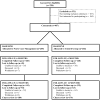A randomized trial of medical care management for community mental health settings: the Primary Care Access, Referral, and Evaluation (PCARE) study
- PMID: 20008945
- PMCID: PMC3775666
- DOI: 10.1176/appi.ajp.2009.09050691
A randomized trial of medical care management for community mental health settings: the Primary Care Access, Referral, and Evaluation (PCARE) study
Abstract
Objective: Poor quality of healthcare contributes to impaired health and excess mortality in individuals with severe mental disorders. The authors tested a population-based medical care management intervention designed to improve primary medical care in community mental health settings.
Method: A total of 407 subjects with severe mental illness at an urban community mental health center were randomly assigned to either the medical care management intervention or usual care. For individuals in the intervention group, care managers provided communication and advocacy with medical providers, health education, and support in overcoming system-level fragmentation and barriers to primary medical care.
Results: At a 12-month follow-up evaluation, the intervention group received an average of 58.7% of recommended preventive services compared with a rate of 21.8% in the usual care group. They also received a significantly higher proportion of evidence-based services for cardiometabolic conditions (34.9% versus 27.7%) and were more likely to have a primary care provider (71.2% versus 51.9%). The intervention group showed significant improvement on the SF-36 mental component summary (8.0% [versus a 1.1% decline in the usual care group]) and a nonsignificant improvement on the SF-36 physical component summary. Among subjects with available laboratory data, scores on the Framingham Cardiovascular Risk Index were significantly better in the intervention group (6.9%) than the usual care group (9.8%).
Conclusions: Medical care management was associated with significant improvements in the quality and outcomes of primary care. These findings suggest that care management is a promising approach for improving medical care for patients treated in community mental health settings.
Trial registration: ClinicalTrials.gov NCT00183313.
Conflict of interest statement
None of the other authors report any potential conflicts of interest.
Figures
Comment in
-
Strategies to close the "mortality gap".Am J Psychiatry. 2010 Feb;167(2):120-1. doi: 10.1176/appi.ajp.2009.09111661. Am J Psychiatry. 2010. PMID: 20123917 No abstract available.
-
Care management increases the use of primary and medical care services by people with severe mental illness in community mental health settings.Evid Based Nurs. 2010 Oct;13(4):128-9. doi: 10.1136/ebn1081. Evid Based Nurs. 2010. PMID: 20855347 No abstract available.
References
-
- Parks J, Svedsen D. Morbidity and Mortality in People with Serious Mental Illness. Alexandria, VA: 2006.
-
- Osborn DP, Levy G, Nazareth I, Petersen I, Islam A, King MB. Relative risk of cardiovascular and cancer mortality in people with severe mental illness from the United Kingdom’s general practice research database. Arch Gen Psychiatry. 2007;64(2):242–9. - PubMed
-
- Saha S, Chant D, McGrath J. A systematic review of mortality in schizophrenia: is the differential mortality gap worsening over time? Arch Gen Psychiatry. 2007;64(10):1123–31. - PubMed
-
- Druss BG, Bradford WD, Rosenheck RA, Radford MJ, Krumholz HM. Quality of medical care and excess mortality in older patients with mental disorders. Arch Gen Psychiatry. 2001;58(6):565–72. - PubMed
Publication types
MeSH terms
Associated data
Grants and funding
LinkOut - more resources
Full Text Sources
Medical



